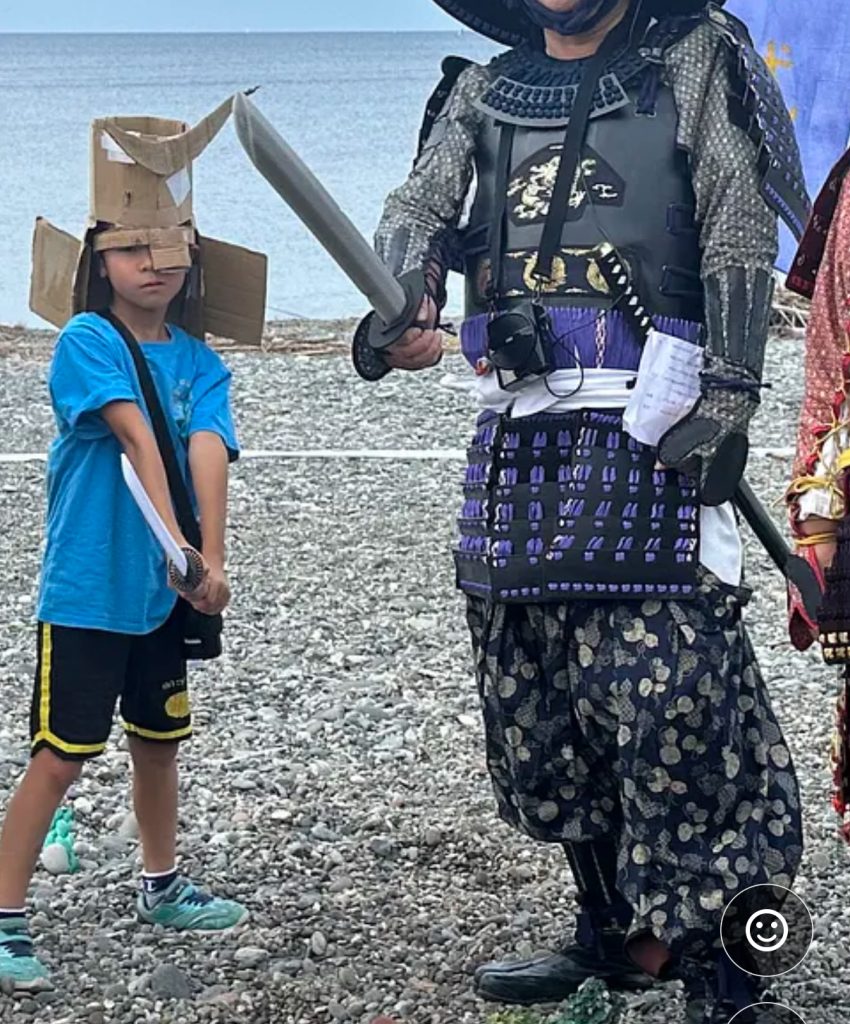第72回 もののあはれ
There is an English translation at the bottom of this article. It’s a little bit long, however, please read it when you have time

次男の歴史好きが高じて、今では『古事記』の本を読んでいます。
なぜ歴史に興味を持つようになったのかといえば、そもそもは近くの木の枝を拾って剣に見立て、日々戦っていたこと(架空の敵と)が始まりです。そこから兜や家紋、戦国武将、お城などへと関心が広がっていきました。
次男に限らず、この令和の時代に沼津の寺で過ごす我が家の子どもたちは、限りなく不安定で――いや、よく言えば臨機応変な親の感性のもとに育っています。
小学校での教育方法は、今ではハラスメントという名の悪になり、中学校で習った内容は教科書から消え、高校受験の方法はすっかり変わり、大学では…勉強したんだっけな?
とにかく、削除と大幅な訂正を繰り返すほど時間を経た私たち親世代は、「結局、何を教わって、何を子どもに堂々と教えてよいのだろうか」という状態が正直なところ。
頑張ってついていこうとは思いますが、足ももつれてくる頃です。
それでも、少なくとも「応援団でありたい」という気持ちに嘘はありません。
彼らがそれぞれのアイデンティティを持ち、私たち以上に変化するであろう世の中を、元気に生きていってほしいと願っています。その生き方は、「ますらをぶり」や「ためやをぶり」などと形容されることもないでしょう。
国学についての知識は浅いですが、仏教が入ってくる以前の、日本人の思想や考え方を探る学問であることは理解しています。
もし子どもが国学にふれることがあれば、少しとはいえ、日本人が大切にしてきたもの、この風土や環境で育まれてきた感覚に向き合えるのではないかと思います。
日蓮聖人もまたこうお手紙に記されています。
「身には今生にはさせる失(とが)なし。ただ国をたすけんがため、生国の恩をほうぜんと申せしを」
――私の身にはこれといった罪はなく、ただ自分の国を助け、生まれた国の恩に報いたいと思っている――
架空の敵と戦っていた子どもは、いつしか昔から大切にされてきたことやものに触れ、そこに込められた思いに気づいていく。
剣はペンに変わり、言葉となり、行動となって、周囲の人々と楽しみながら、より良い生活や生き方を目指していく。
そんな明るい未来を、子どもたちには歩んでほしいので・・・いやいや、肝心なところが抜けています。
そう思って、大人たちからの愛情を受けて育ったのが、私たち自身です。
期待も大事ですが、今の自分も工夫して、もう一踏ん張りしなくてはなりませんね。
え、やっぱり足がもつれそう?
大丈夫。その姿もまた、「もののあはれ」でしょうから。
Episode 72: Mono no Aware
My second son’s love of history has grown to the point where he’s now reading the Kojiki.
His interest in history began with picking up nearby tree branches to use as swords and fighting daily (against fictional enemies). From there, his interest expanded to include helmets, family crests, Sengoku warlords, castles, and more.
My second son isn’t the only child in my family, who spends his time at a temple in Numazu during the Reiwa era. They’re being raised by parents who are incredibly unstable—or, to put it nicely, adaptable.
Elementary school education methods have become a bad thing, known as harassment, the content learned in middle school has disappeared from textbooks, the high school entrance exam process has completely changed, and in college… did they even study?
Having spent so much time on the books, with repeated deletions and major revisions, our parent generation is honestly left wondering, “What were we taught, and what can we proudly teach our children?”
I’m trying my best to keep up, but it’s starting to get a bit tangled up.
Still, I’m not lying when I say I want to be their cheerleader.
I hope they will have their own identities and live energetically in a world that will likely change even more than ours. Their way of life will likely never be described as “masura wo buri” or “tameyawoburi.”
My knowledge of Kokugaku is limited, but I understand that it is a discipline that explores the thoughts and ways of thinking of Japanese people before the introduction of Buddhism.
If children are exposed to Kokugaku, even if only a little, I think they will be able to confront the things that Japanese people have held dear, the feelings that have been nurtured in this climate and environment.
Nichiren Shonin also wrote this in a letter:
“I have committed no sins in this life. Simply to save my country, I have spoken of the kindness of my native country.”
–I have no particular sins, and I simply want to help my country and repay the kindness of the country of my birth.–
Children who fight imaginary enemies will eventually come into contact with things and traditions that have been cherished since ancient times, and realize the feelings that are embedded in them.
The sword turns into a pen, which becomes words, which become actions, and with these we strive for a better life and way of life, all while having fun with the people around us.
We want our children to walk towards such a bright future… but no, that’s missing the point.
We ourselves were raised with this thought, receiving love from adults.
Expectations are important, but now we also need to be creative and hold on a little longer.
Oh, it looks like we’re about to stumble after all?
Don’t worry. That, too, is an example of mono no aware.